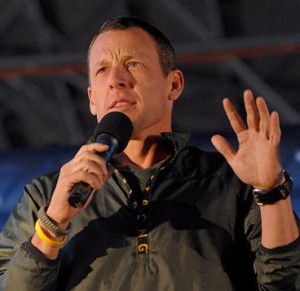 First, a caveat, I was never a big fan of Lance Armstrong – something about his demeanor or behavior felt a little too self-absorbed for me. Although arguably a great athlete, he was singularly focused on the win to the extent that he was willing to destroy others. Even when he started his charity, Livestrong, it was because of what happened to him – his ordeal, his cancer. Let’s face it, Lance loves Lance and loves to be the center of his universe.
First, a caveat, I was never a big fan of Lance Armstrong – something about his demeanor or behavior felt a little too self-absorbed for me. Although arguably a great athlete, he was singularly focused on the win to the extent that he was willing to destroy others. Even when he started his charity, Livestrong, it was because of what happened to him – his ordeal, his cancer. Let’s face it, Lance loves Lance and loves to be the center of his universe.
When I saw his confession, I was struck by several things. First was the seeming lack of remorse. He didn’t really apologize but rather acknowledged what everyone else already knew. He admitted to lying extensively throughout his career, but he also didn’t believe lying was wrong at the time, as long as it was getting him what he wanted. The fact that he had to look up “cheating” in the dictionary and that he didn’t believe that’s what he was doing is pretty incredible. He also seemingly had no regret about the ruined lives on the road to his goal. Although there was evidence and ongoing accusations of his cheating behavior throughout his career he steadfastly denied it, defended it and took out anyone who said differently, until now.
Why now? He wants something. He wants to compete in triathlons and wants his suspension from doing so lifted. Lance wants what Lance wants. So he did what he had to do to get what he wanted, as he always has. Would he have confessed had he not wanted something? Doubtful.
All of this is relevant to leadership because leadership is about character. Why should we follow you? What do you stand for and why should we care? Character is about doing the right thing, even when it’s not in your own best interest. People were inspired by Lance’s story – overcoming cancer, winning 7 Tour de France titles – and they wanted to be like him. Not so much now.
Character is yours. It is a manifestation of your values. If what you are doing shows courage, innovation, integrity, and doing what’s right, people will be inspired and will follow. Lance showed courage and certainly innovation in getting around the rules to get what he wanted, but his absolute lack of integrity, and willingness to do wrong doomed his legacy. His behavior was consistent with his character, we the public just didn’t fully know what that was. Now we do. Now we know that he is not remorseful, only does what is best for him, and will do what it takes to win at all costs. Most of us know what that line is. Lance has a different measuring stick because he believes himself to be special – a narcissistic character trait.
A true leader’s character is on display at all times. You feel inspired to follow, to be like them, to do better because of them. Lance’s character was always on display, we just wanted to believe the fairy tale PR narrative, not those who dared to tell the truth about him. It took an overwhelming amount of evidence and a dogged investigation by USADA’s Travis Tygart to wake the public from the dream and force Lance out into the open. Now we’re the ones ashamed for him. Too bad he’s not.
Let’s hold our leaders and role models accountable for their behavior and for their character. Let’s hold ourselves accountable to look at our leaders with clarity and not just follow because they are charismatic or have spun a great story. Let’s not pretend a leader is something he is not, even if he has a lot of money and a great PR team. Next time you listen to a leader, listen for their agenda – what do they want? What are they trying to get? If they want nothing, it’s likely genuine. If they want something – ask more questions.
